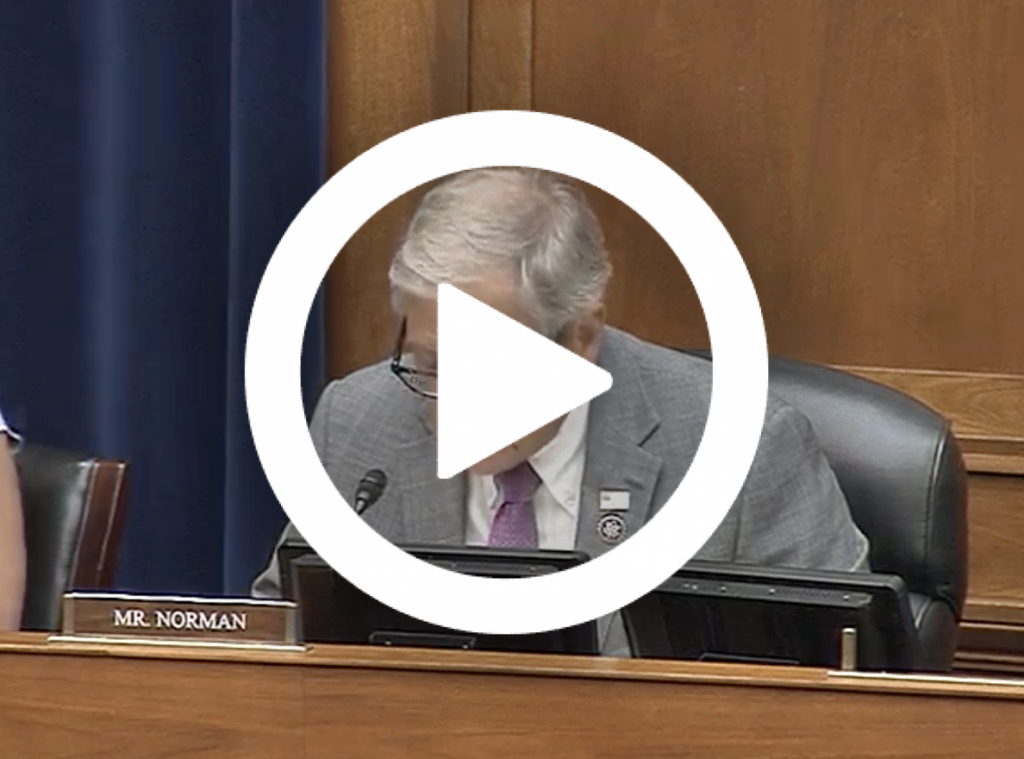Norman: Americans all over the country are dealing with the realities of the Biden administration’s policies
Massive government mandates will only hamper America’s pandemic recovery
WASHINGTON—Subcommittee on the Environment Ranking Member Ralph Norman (R-S.C.) opened today’s hearing on “Jumpstarting Main Street: Bringing Jobs & Wealth Back to Forgotten America,” by emphasizing how the Biden Administration’s radical policies, such as the American Jobs Plan and the Green New Deal, would place an enormous financial burden on all Americans, stifle affordable energy, and destroy millions of quality jobs.
In his remarks, Subcommittee Ranking Member Norman notes the United States has made substantial progress in reducing carbon emissions, having reduced more than the next 12 emission reducing countries combined. The progress, accomplished largely under the Trump Administration’s pro-innovation energy policies, also ushered in an era of reliable and affordable energy. Subcommittee Ranking Member Norman concluded a premature move away from fossil fuels by the Biden Administration jeopardizes affordable, reliable energy that enables economic growth and encouraged lawmakers to support responsible policies that simultaneously promote innovation and invest in clean energy infrastructure.
Below are his remarks as prepared:
Thank you, Chairman Khanna for holding this hearing. And thank you to the witnesses for their willingness to appear before the subcommittee.
The title of this hearing is “Jumpstarting Main Street: Bringing Jobs & Wealth Back to Forgotten America.” This is an ironic title for the hearing considering that it is the forgotten who are the ones that are being left behind by this administration. The President’s American Jobs Plan would place an enormous financial burden on the American taxpayer, in particularly low-income Americans who are suffering disproportionally from spikes in inflation.
The American Jobs Plan calls for hundreds of billions of dollars to be spent on reducing climate and energy emissions in order to address climate change as one of the “greatest challenges of our time.” The plan includes a vague $213 billion proposal that will, “produce, preserve and retrofit more than two million affordable and sustainable places to live.” I am very interested to learn more about the plans for spending this massive sum of taxpayer money and how that will bring jobs and wealth back to Forgotten America. To say that I’m skeptical is an understatement.
Over the past year and a half, the world’s economy has essentially been shut down due to the COVID-19 pandemic. However, even with this halt in activity, a recent National Oceanic and Atmospheric Administration (NOAA) report from April of this year shows that it barely made an impact on the amount of carbon-dioxide in the atmosphere.
If the most unparalleled shutdown in human activity that closed schools and businesses around the world barely impacted CO2 levels, it raises serious questions about whether spending massive amounts of U.S. taxpayer money will actually affect the climate, especially while countries like China and India continue to pollute at record levels.
The United States has made great strides when it comes to emissions. The most recent U.S. EPA annual air quality report shows that we are leading the world in reducing emissions, having reduced more than the next 12 emission reducing countries combined. Because these reductions have come as a result of innovation and market forces, energy costs have decreased nationwide.
The progress made in energy innovation during the Trump Administration is at risk because of the radical ideas the left is proposing. The Green New Deal would ruin our economy and do away with affordable energy while destroying millions of jobs.
Americans all over the country are dealing with the realities of the Biden Administration’s policies. Gas and lumber prices have skyrocketed since January. Lumber prices are up over 200% since this time last year and in the past few weeks I’ve seen hard working South Carolinians waiting in long lines at the gas station. This is not the American energy dominance that we had seen over the prior four years.
As Representatives, we will continue to support responsible policies that work to solve our problems by promoting innovation and investing in clean energy infrastructure.
However, I fear that a premature move away from fossil fuels, particularly for poorer areas, means that they will continue to have little access to the type of cheap, reliable energy that enables economic growth.
I look forward to hearing from Mr. Shay Hawkins today from the Opportunity Funds Association to learn more about the work he is doing to help promote Opportunity Fund investments in distressed rural and urban communities.
We should be looking at ideas like Opportunity Funds to ensure that America is able to help families and businesses rebound form the Covid-19 pandemic instead of relying on massive government mandates that will only hamper the recovery.
The United States has abundant clean energy natural resources. We must use those resources to advance American interests while continuing to lead the world in emissions reductions.
Thank you, Mr. Chairman, and thank you to today’s witnesses.
